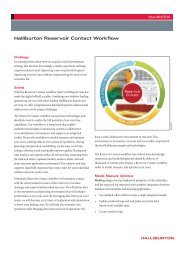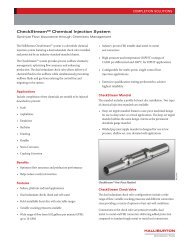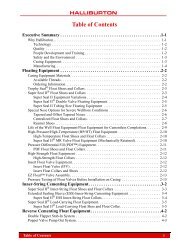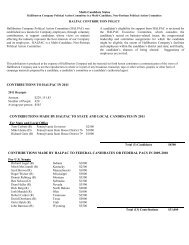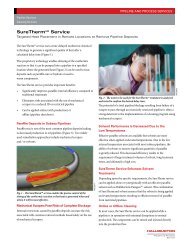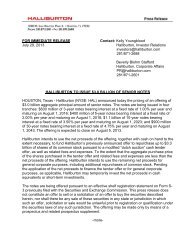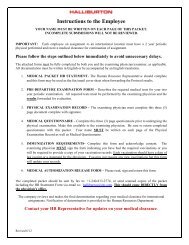COBC - Code of Business Conduct - Halliburton
COBC - Code of Business Conduct - Halliburton
COBC - Code of Business Conduct - Halliburton
Create successful ePaper yourself
Turn your PDF publications into a flip-book with our unique Google optimized e-Paper software.
Anti-Bribery and Anti-Corruption<br />
Prohibition <strong>of</strong> Bribery<br />
Bribes are illegal in virtually every country. Because<br />
<strong>Halliburton</strong> conducts business around the world, we<br />
are subject to numerous laws that prohibit receiving,<br />
<strong>of</strong>fering, providing or authorizing the payment <strong>of</strong><br />
bribes <strong>of</strong> any kind to anyone. These include the U.S.<br />
Foreign Corrupt Practices Act (FCPA) and the U.K.<br />
Bribery Act 2010 (U.K. Bribery Act), which apply to<br />
our operations around the world.<br />
At <strong>Halliburton</strong>, we do not bribe or use any other<br />
means to improperly influence the decisions <strong>of</strong><br />
others, including customers, potential customers or<br />
government <strong>of</strong>ficials. No <strong>Halliburton</strong> employee may<br />
authorize, provide or <strong>of</strong>fer anything <strong>of</strong> value (or do<br />
so through a third party) to a government <strong>of</strong>ficial,<br />
company or individual for the purpose <strong>of</strong> obtaining<br />
or retaining business, gaining influence, or seeking<br />
any other advantage for the Company. It is also illegal<br />
for <strong>Halliburton</strong> employees to accept bribes or<br />
request anything <strong>of</strong> value from suppliers or other<br />
third parties.<br />
No employee will ever be disciplined for refusing<br />
to pay a bribe, regardless <strong>of</strong> its impact on sales,<br />
pr<strong>of</strong>itability, project completion or other aspects<br />
<strong>of</strong> our business. The ultimate cost and long-term<br />
detrimental effects <strong>of</strong> bribery and corruption far<br />
outweigh any short-term benefits.<br />
Failure to comply with any anti-bribery laws will<br />
result in disciplinary action, up to and including<br />
termination <strong>of</strong> employment. Additionally, violations<br />
<strong>of</strong> anti-bribery laws, including both the FCPA and<br />
the U.K. Bribery Act, may result in criminal and<br />
civil penalties for both the Company and individual<br />
employees. These penalties can include significant<br />
fines and jail terms for those involved.<br />
Take Note!<br />
A “foreign government employee” means<br />
an individual who is a non-U.S. government<br />
employee, including any <strong>of</strong>ficer or employee<br />
<strong>of</strong> a foreign government unit or national oil<br />
company.<br />
Regulators consider government employees,<br />
candidates for political <strong>of</strong>fice, party <strong>of</strong>ficials,<br />
members <strong>of</strong> the royal family, and even all<br />
employees <strong>of</strong> government-owned businesses<br />
(such as national oil companies) to be<br />
“government <strong>of</strong>ficials.” Also included are<br />
<strong>of</strong>ficials and employees <strong>of</strong> public international<br />
organizations such as the World Bank.<br />
In addition, gifts or bribes to a family member<br />
<strong>of</strong> a government <strong>of</strong>ficial can be considered to be<br />
bribes to foreign <strong>of</strong>ficials.<br />
Be aware that the bribery <strong>of</strong> foreign government<br />
employees and the bribery <strong>of</strong> commercial<br />
personnel are both prohibited by this <strong>Code</strong>.<br />
34




